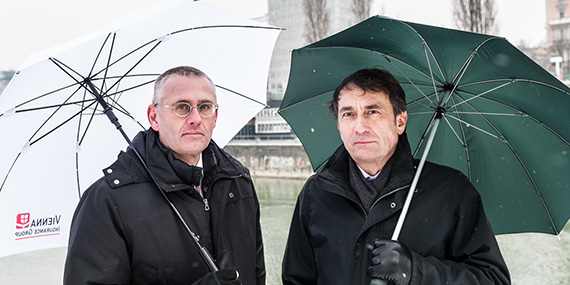
Gerald Klemensich, Head of Reinsurance, Vienna Insurance Group, Vienna, Austria
Roman Brablec, Head of Reinsurance, Kooperativa and ČPP, Prague, Czech Republic
How afraid should we be of severe weather events in the future, Mr Klemensich and Mr Brablec?
Klemensich: We actually should be afraid of them, really. Unfortunately, we tend not to worry and instead simply suppress any thoughts we may have regarding major risks. But that’s just how people are. Therefore our company has specialists like the two of us: a sort of “professional worriers”. It’s our job to make sure that natural disasters like hail, storms and floods don’t turn into major losses on our company’s balance sheet. Put more simply, we insure our insurance company against the worst.
We, the people in charge of reinsurance, sometimes have to argue a bit to justify ourselves as long as no losses happen. However, whenever a disaster does occur somewhere and the losses stay limited thanks to our safety net, all naysayers suddenly disappear.
“There is one thing we will certainly never do: fail to reinsure ourselves properly.”
Our shareholders therefore do not have to worry. We can calculate our maximum liability for major losses each and every day. And as an insurance company, there is one thing we will certainly never do: fail to reinsure ourselves properly as a result of not being as afraid enough of the unpredictability of natural disasters.
Brablec: As reinsurance managers we look to the future with cautious optimism despite long-term gradual increase in natural catastrophe events affecting our industry. Why? Quite simply because humans are capable of learning. Take, for example, the 2002 flood in the Czech Republic, when floodwater from the Vltava River turned the Prague underground trains into a fleet of submarines. This was just a single massive loss in a flood disaster that had many people very worried. We thankfully had adequate reinsurance protection in place, which we believe to have also now when using much more sophisticated modelling tools for our natural catastrophe exposure assessment. In addition, people who have been affected by an experience like this change their behaviour afterwards and learn from it. When the last flood occurred in 2013, the people of Prague had already deployed their mobile flood protection system, preventing the worst and considerably reducing overall claims.
“In the media, you hear and read a great deal about natural disasters. At the same time, however, most of us have much better insurance coverage than before.”
If you follow the reports in the media, you hear and read a great deal about natural disasters. At the same time, however, most of us have much better insurance coverage than before. Many losses were simply not covered in the past. The fact that we have higher insurance penetration today is naturally playing significant role. Therefore, an increase in insurance claims does not necessarily mean just more disasters, but also more growth in our sector. Important is to use sophisticated and consistent underwriting approach in order to keep natural catastrophe exposure under control.

